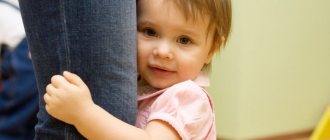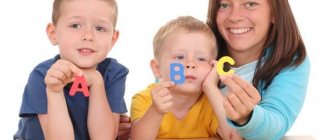The topic of child adaptation in kindergarten is always relevant, but in recent years it has become increasingly acute. The pace of modern life dictates its own rules, and parents do not want to lag behind it, so from an early age they send their child to kindergarten, where they are faced with difficulties in getting the child accustomed to new conditions and do not understand how to resolve them correctly.
Development and education of children from 2 to 11 years old in a playful way
Start practicing right now
Start practicing
In this article we will look at what a child’s adaptation to preschool is, what degrees and stages of adaptation exist, and how to help a child successfully overcome this difficult period.
What is adaptation
The term adaptation (lat. adaptatio) means “adaptation”. When they talk about a child’s adaptation in kindergarten, they mean his adaptation to new conditions - the people around him, the daily routine, new rules, the absence of parents. From this moment the active socialization of the child begins, which may be accompanied by some difficulties.
During the adaptation period, emotional and physical instability can be observed - the child may cry often, miss his mother, get upset over little things, stop eating or sleeping. This is fine.
What influences a child’s adaptation to kindergarten?
Factors that influence the process of a child’s adaptation to a preschool institution include:
- his age;
- general physical development and health status;
- presence or absence of basic self-care skills;
- correspondence between the home regime and the daily routine of the preschool institution;
- level of contact and sociability;
- development of gaming activities.
Children who are not used to:
- regime;
- performing basic hygiene procedures;
- independent play with toys;
- interaction with peers and unfamiliar people.
In addition, the baby may have peculiar habits that negatively affect his development. Adaptation is very difficult if the child is too attached to his mother.
Tips for the teacher: how to facilitate the adaptation process
The teacher plays an important role in the child’s adaptation process. The quality of his interaction with the child and with the parents affects how the whole process will go overall and how quickly it will end.
Teacher's work with parents
For adaptation to be painless, the teacher first needs to establish contact with the parents.
- Invite parents on a tour of the daycare before they bring their child there. Let them see where their children will sleep, play, eat and study. Familiarize them with the daily routine. Parents' peace of mind is the key to a child's positive attitude towards kindergarten. Any anxiety of parents will be transmitted to children.
- When your child is in a group, create a chat for the parents of this group in any popular instant messenger, such as Whatsapp or Telegram. Keep active and dialogue in this chat - answer questions, publish news and announcements. Such a chat will give parents a sense of control and peace of mind, because they will be able to get information about their child at any time.
- Agree with parents to bring their children to kindergarten 5-10 minutes apart. This will allow you to meet each child individually and establish contact with them so that the process of parting with parents is more painless.
You can print and distribute to parents the Kindergarten Adjustment Guide developed by our experts. .
Once contact with parents is established, relationships with children can be built.
Teacher's work with children
It is important to establish a trusting relationship with your children so that they feel safe around you.
- When you first meet your baby, be gentle with him. Show sincere kindness, smile, offer your help, show interest in him, for example, ask questions about his mood and well-being. From the first meeting, the child should get the impression that you can be trusted, that you are a friend who will always help.
- Get to know your child in an informal setting. For example, join your baby and mom for a walk. Then the child will perceive you as an acquaintance when he sees you in kindergarten.
- Create a warm and homely atmosphere in the group so that children feel comfortable and safe. This can be done with the help of decorative items - indoor flowers, small houses or corners for privacy. Children can bring their own toys so that familiar objects are nearby.
- Touch and hug children periodically. Tactile contact gives them a feeling of security and helps them adapt faster.
- Many children want their mother to be nearby. You can satisfy this need in kindergarten by creating a “family” album. Place it in free access so that the child can come up and look at a photo of mom or dad at any time.
- Involve children in group and individual interesting games. If children are carried away, their worries will fade into the background. In addition, games will help to form in the teacher the image of a leader who will come to the rescue in any situation.
Consultation for educators “Organization of children’s adaptation to the conditions of preschool educational institutions”
Branch No. 1 "Topolek" of the municipal budget preschool
educational institution No. 105 of the city of Penza “Detsvo”
Consultation
“Organization of adaptation of children to the conditions of preschool educational institutions”
Educator: Buylakova S.S.
Penza
2018
Adaptation of children to kindergarten
Kindergarten is a serious challenge in a child’s life, a big test for a child. Any test makes a person stronger, moves him forward in development or, on the contrary, throws him back. Therefore, today the topic of organizing the pedagogical process during the period of adaptation of young children to the conditions of a preschool educational institution is relevant. Adaptation is considered as the body’s adaptation to a new environment, which includes a wide range of individual reactions depending on the psychological and personal characteristics of the child, the specific nature of family relationships and upbringing, and the conditions of being in the garden. Much in his behavior depends on how adults approach the baby during the adaptation period, how they can organize his life in a group.
A child’s admission to kindergarten is a special period of life for the whole family: both for the child and for the parents. For a baby, this is a strong stressful experience that needs to be mitigated. He will have to adapt to completely different conditions than those to which he is accustomed in his family. A clear daily routine, the absence of parents, as a rule, a different style of communication, the need to communicate with peers, a new room - all these changes create a stressful situation for the child. These new factors cause a defensive reaction in the baby in the form of crying, refusal to eat, sleep, and communicate with others.
Both teachers and parents must understand how important the moment of a child’s adaptation to the conditions of kindergarten is and how serious consequences it can provoke for the child’s health.
There are three degrees of adaptation of young children to kindergarten conditions - mild, moderate and severe. This gradation is based on the following indicators:
— Quick normalization of the child’s emotional well-being;
— Displaying a positive attitude towards teachers and peers;
— Having an interest in the objective world;
— Frequency and duration of acute viral diseases.
Easy adaptation takes place within 1-2 weeks. The child’s experiences are observed for no more than 14 days. The baby quickly begins to show interest in those around him: teachers and children, and minor disturbances in sleep and appetite are observed. The child is not sick, by the end of the second week he can easily separate from his parents, and his emotional state is normalized.
With moderate adaptation, children experience significant disturbances in sleep and appetite, which return to normal by the end of the month. The baby is usually passive, capricious, irritable, often cries, he is not interested in toys, and he stops using an active vocabulary. Disturbances in the functioning of the autonomic nervous system often occur - this is expressed in the appearance of pale skin, sweating, shadows appear under the eyes, and changes in stool are recorded. The child is susceptible to infectious diseases that are severe. Typically, the described symptoms begin to subside a month after the first visit to kindergarten.
The most dangerous for a child’s health is a severe degree of adaptation to a preschool institution. A child who finds it difficult to get used to kindergarten is usually susceptible to long-term and serious illnesses. The baby’s immune system cannot cope with infections, and they begin to replace one another. He is emotionally exhausted, capricious, and neurotic states are often observed. Parents and teachers are concerned about the baby's appetite - he refuses to eat, and attempts to feed him may end in vomiting. Sleep is disturbed, the child sleeps very lightly, often wakes up, cries in his sleep, and cannot fall asleep for a long time. The baby is not happy with the environment. He refuses to play with his favorite toys, hardly communicates with other children, and is passive in communication with adults. Depending on individual typological characteristics (type of higher nervous activity, type of temperament), a child can be either quiet and depressed, or, on the contrary, aggressive and hysterical. This condition can be observed for several months, while all the vital forces of the baby are suppressed, and the pace of physical and mental development slows down.
The peculiarity of a child’s adaptation to new conditions is due to the specific characteristics of an early age. This period is the most crucial period of a person’s life, when the baby’s basic skills are formed, so necessary for his successful development. At this time, such dominant qualities as cognitive activity, independence, initiative, sociability, trust in the world, self-confidence, a friendly attitude towards people, and creative potential develop. But their formation requires adequate actions on the part of adults, certain forms of communication and active interaction with the child. The main lines of development of young children are:
— development of subject activity;
— development of emotionally effective communication with adults.
The leading role of objective activity in the development of a child is obvious. Inclusion in objective activities allows the child to develop culturally normative, specific and instrumental actions. Use surrounding objects in your daily activities (eating with a spoon, digging with a spatula, using a comb, etc.) in accordance with their social purpose.
In early childhood, there is an intensive development of visual-effective thinking and cognitive activity, the formation of purposefulness and perseverance of the child’s actions. Constructive games and toys are used to develop actions.
A special feature of early childhood is the specific mode of life of the baby. As a rule, the child spends this important period of his development in the family. A family environment is optimal for a child - the love of close adults, their sensitive and flexible attitude, individual communication are a necessary condition for his normal development and good emotional well-being. In modern conditions, families are often forced to interrupt the harmony of the child’s development at home and use the services of a kindergarten.
The main task that kindergarten workers and parents solve at this time is to make kindergarten desirable for the child. It is necessary that separation from home, from loved ones, meeting new adults, unfamiliar peers does not become a serious psychological trauma for the child.
The adaptation period is considered complete if the child eats with appetite, falls asleep quickly and wakes up on time in a cheerful mood, plays alone or with peers.
Recommendations for educators on organizing children’s activities during the period of adaptation to kindergarten
Psychological and pedagogical support for children’s adaptation to preschool conditions
Adaptation of children in kindergarten has always been and remains the most psychologically difficult period for both the child and his parents, and for teachers. Taking into account the specifics of the adaptation period will help not only to find the right approach to the child, but also to lay the preconditions for his successful socialization in the new team.
Main features of the normal current period of adaptation
Mood disorders
Tearfulness, moodiness, depression in some children; excitability, anger, aggressive manifestations in others (duration - from a week to 1.5 months).
Sleep disorders
Children very often begin to sleep worse, have difficulty falling asleep in the evening, and may cry before going to bed; in the morning it can be very difficult to wake them up at the right time. Some children cannot fall asleep during the day in kindergarten, become overtired and quickly fall asleep in the evening. Others, overexcited, cannot calm down until 22-23 hours. Lack of sleep affects the well-being of children almost immediately and has a complex negative effect on the nervous system (duration - from 1 to 2 months).
Appetite disorders
Children begin to eat poorly (both at home and in the garden) for the reason that they are offered unusual food, new dishes that taste unfamiliar. For children who are accustomed to eating pureed food at home, the consistency of the dishes in kindergarten may be unexpected. In combination with the increased nervous excitability of some children, this can lead to short-term gastrointestinal disorders - vomiting, abdominal pain, hiccups, and sometimes food allergies (duration - from 1 week to 1 month).
Decreased immunity
Due to stress, the immune system of young children suffers, they begin to get sick often (usually ARVI), react to hypothermia, overheating, and drafts much more often than in the normal state; easily become infected from each other (duration - from 2 to 10 months, for some even longer).
Behavior disorder
Children seem to return to earlier stages of development, play worse, games become more primitive, cannot tear themselves away from their mother even at home, and begin to be afraid of strangers. Some experience a loss of self-care skills, hygiene skills (they do not ask to go to the potty, have difficulty washing their hands, etc.) (duration - from 1 week to 2 months).
Recommendations for the adaptation of children in kindergarten
Most children begin attending child care at the age of 2.5-3 years. For some of them, the transition from a home environment, familiar and favorite toys, and close adults is more or less easy, and after 2-3 months they get used to kindergarten. For others, it turns into a tragedy, fraught with behavioral disorders, a sharp deterioration in health, constant dysphoria (low emotional background, bad mood), and in the future even early neuroticism, leading to the appearance of multiple psychological and neurological disorders.
At the age of 2-3 years, a child is not able to play with toys, even very attractive ones; he still does not know how to communicate with other children, does not understand them and cannot express his desires, thoughts, feelings so that he is understood. Some children may simply be afraid of strangers.
For any teacher, the period when many newcomers come to the group is a great challenge. It is especially important at this time to lay the foundations of favorable relationships between children in the group and to create the prerequisites for emotional comfort for each child. All further tasks related, for example, to learning, self-care, etc., are secondary, since their implementation may be possible a little later, when the children calm down and make contact.
Working with parents of children entering kindergarten should begin long before they bring their child. Even when enrolling a child in an institution, the mother should receive clear information about the adaptation period and what she personally can do to make this period as easy as possible for the child. Parents and educators should be aware of the specifics of the adaptation period, its stressful effect on the child, its duration (1.5-3 months), and possible violations.
Activities of the teacher during the period of children’s adaptation to kindergarten.
The teacher needs to warn parents about the peculiarities of children’s adaptation to new conditions and ask them to be sure to talk about how the child behaves at home. If the baby has been accustomed in advance to the daily routine that awaits him in kindergarten, if he knows how to ask to go to the toilet, is ready for raw and varied food, knows how to play with toys, is interested in them, is capable of at least short-term contact with other children, and is not afraid of them , trusts the teacher, then most of the problems associated with the adaptation period will pass. It will be easy for both parents and teachers.
If the parents have not prepared the child for preschool, if he has certain disorders of the nervous system (perinatal encephalopathy, minimal brain dysfunction, etc.), which, unfortunately, is becoming more common, or suffers from chronic diseases at the stage remission, then his adaptation to kindergarten will be difficult.
The teacher of the group first of all is faced with the fact that children who start attending kindergarten are very different in their skills, level of physical and mental development. In a short time, you have to organize a more or less homogeneous group, where everyone at least understands what is happening around them and what is required of them.
It is known that those children who, firstly, are not afraid of peers and adults, adapt most easily to kindergarten, i.e. accessible to contact, and secondly, they know how to play or at least deal with toys on their own or with other children.
From the first days of a child’s stay in a preschool educational institution, the teacher should try to provide, first of all, psychological and physical comfort for children, to mitigate the difficulties of the transition from a home (different for everyone) to a public (same for everyone) way of life. This determines the opportunity to solve the most noticeable problems that arise in the first month, when babies’ adaptation to new conditions gives them so many unpleasant moments.
To address children of early and early preschool age who have just started going to kindergarten, it is necessary, on the one hand, individually, by name: “Katenka, let’s go wash our hands,” and on the other hand, emphasize the child’s belonging to the group, teach them to respond to the address “ Guys,” etc.: “Guys, now let’s all sit down at the tables!” And you, Katya, sit down, and you, Vitya, right here.” All actions that are unusual for children must be spoken out, explained, repeated many times: “Now we will all get dressed, go to our lockers - this is Misha’s closet, and this is Mashin’s, and this is yours. And you, Sonya, are great, you found your closet yourself.”
If children understand the teacher, it is easy to teach them things that they have not encountered at home or are used to doing differently. It is important to maintain an individual approach - you need to remember who can do what and who has what difficulties.
At the same time, the teacher tries to draw the children’s attention to each other, to ensure that they remember what their names are and, if possible, can address each other and the teacher by name. For this, there are special games aimed at getting to know each other, remembering names, as well as rituals of greeting and farewell to each child: “Here, guys, Helen has arrived. Hello, Lenochka! Let's all say hello to her!..”, “Vitalik went home. Let's say goodbye: bye-bye, Vitalik! Till tomorrow!" In games such as "Tank Engine", children are carriages, and each has its own name. “The first carriage is Sasha, the second carriage is attached to it - Ilyusha, the third carriage is Verochka, and the locomotive today will be Anyuta!”
Constant repetitions help children quickly remember what their names are, and games (under the guidance of a teacher) contribute to the emergence of first contacts, physical and playful.
Much attention should be paid to guiding children's play, showing simple actions with toys, accessible plots, and playing them with different toys. Gradually, the kids begin to repeat them, supplement them, make changes - the first games appear. And a child who is able to occupy himself with toys is in a good mood, does not cry, and more easily comes into contact with other children, first repeating certain actions after them, then communicating outside of play situations.
There are children who find it very difficult to eat and sleep in an unfamiliar environment. It may take several days before the child agrees to remain alone in the group, without his mother. It is good to advise his mother to give him a toy with her (not a new one, but not his favorite one either - in order to avoid conflicts), just so that something familiar remains with him, “a piece of home.” Such a child must be shown the crib in advance, demonstrate how others lie down, promise that the crib will wait for him, and tomorrow he will be able to sleep on it.
Based on the typical difficulties with sleep, appetite, instability of hygienic skills, etc. during the adaptation period, it is important for the teacher and assistant teacher to take into account the age and individual characteristics of the children as much as possible. If a child does not eat well, it is unacceptable to force feed him or even simply insist on “finishing” the entire portion: at this age, neurotic vomiting easily occurs and becomes permanent. If he doesn’t fall asleep, you need to give him a toy, sit with him, calm him down, allow him not to sleep, but just close his eyes and lie quietly. Children with poor hygiene skills should be invited to the toilet more often. They need to be reminded of this during walks. They must have a supply of spare clothes and linen. Usually these problems disappear by the end of the first month of visiting kindergarten, but after a long absence (for example, due to illness) they may reappear for a short time.
If educators and parents together kindly but firmly direct the child’s life in a new direction, there will be no special problems with the child (if he is physically and mentally healthy).
Memo on organizing the pedagogical process during the adaptation period (for teachers and assistant teachers of early age groups)
During the adaptation period, an individual regimen is established for each newly admitted child, taking into account the recommendations of the doctor, educational psychologist, and senior educators. Over time, all children are transferred to the general regime.
During the adaptation period, it is necessary to take into account all the child’s individual habits, even harmful ones, and under no circumstances re-educate him.
An adult should caress the child more often, especially when putting him to sleep: stroke his arms, legs, back (children usually like this). A good effect of falling asleep is achieved by stroking the baby's head and eyebrows, while the hand should only touch the ends of the hair.
It doesn’t hurt to show the child a child care facility in the first days in order to let the child know that he is loved here.
In a psychologically tense, stressful situation, switching to an ancient, strong food reaction helps. It is necessary to offer the child to drink and chew crackers more often.
Monotonous hand movements or squeezing of the hands inhibit negative emotions, so the child is offered games: stringing balls on a cord, connecting parts of a large Lego constructor, playing with rubber squeaky toys, playing with water.
Periodically turn on low, calm music, but strict dosage and definition during playing are required.
The best cure for stress is laughter. It is necessary to create situations so that the child laughs more. Fun toys and cartoons are used, and unusual guests are invited - bunnies, clowns, foxes.
It is necessary to eliminate the monotony of children’s lives, i.e., define themed days.
Eliminate intellectual and physical overload.
It is necessary to look closely at the individual characteristics of each child and try to understand in time what is behind the silence, calmness, and passivity of some children.
The immutable rule is not to judge the child’s experience and never complain to parents about it. All the child’s problems become professional problems for the teacher.
Talk to parents every day, instill confidence in them, dispel worries and concerns about their child.
Internet resources used.
https://nsportal.ru/detskiy-sad/raznoe/2017/01/31/rekomendatsii-vospitatelyam-po-organizatsii-deyatelnosti-detey-v
https://www.maam.ru/detskijsad/adaptacija-v-jaselnoi-grupe.html
https://scastliwymalish.ru/rebenok-i-yasli/adaptatsiya-detey-rannego-vozrasta-v-yaslyah
Algorithm for adaptation to kindergarten
Adapting a child to kindergarten is a step-by-step process. The teacher’s task is to regulate these stages and guide parents.
It is better to start visiting kindergarten with daytime and evening walks with a group. The mother stays next to the child during these walks. During the first week, you can bring your child for a few morning hours. If possible, the mother stays in the group with the child; if not, then she simply comes to pick him up after a morning walk.
During the second week, the baby's stay increases until lunchtime. He eats with the others, after which his mother takes him home. In the third and fourth weeks, the baby can be left for a nap and picked up immediately after sleep or after an afternoon snack.
After the fourth week, the child can be left in kindergarten full time. During the adaptation period, it is important to bring the child in first or last so that he does not see the tears of other children. It is better to feed the child at home, since many children refuse to eat in an unfamiliar environment, especially unusual food.
The influence of various factors on adaptation
Why do some children adapt easily, while others have difficulty? What influences this process?
Child's age
In many families, after the birth of a baby, the level of material well-being changes, so mothers tend to send their child to kindergarten and go to work as soon as possible. It is not surprising that in recent years the need for nurseries, which accept children from 1.5 years old, has increased.
But how ready is the baby for this? Most teachers and psychologists believe that the appropriate age to begin adapting to kindergarten is 2.5-3 years, when the child’s immunity has already strengthened, he has basic self-care skills and is not in such dire need of parental care and attention. The younger the child, the more complex and difficult the adaptation is. Therefore, if possible, it is better to leave children under 2.5 years of age at home.
Of course, there are exceptions when the baby is ahead of his development and needs communication, shows interest in his peers, actively participates in all games, and is simply bored at home. In such cases, kindergarten is a suitable environment for a little fidget, even if he has not reached 2.5 years.
Health status
This is one of the key factors. Often, even healthy children, when they start going to kindergarten, often get sick. For children with disabilities or chronic diseases, the process of adaptation is especially difficult.
Therefore, first improve your child’s health, and then start attending kindergarten. This way the baby will be able to adapt without serious problems.
State of the art
Here it is important to talk about the necessary skills that a child must have before starting kindergarten life: hold a spoon and a cup, drink and eat independently, use the potty, if possible, dress and undress and ask for help from an adult.
If the baby does not have self-care skills and is accustomed to his parents doing everything for him, then the process of adaptation can take a long time.
Socialization of the child
In a preschool institution, a child will be in the company of peers and teachers. If a child has experience communicating with other children and adults, besides parents, then it will be easy for him to join the team. When a child is used to seeing only mom and dad next to him, the process of getting used to it will be more difficult and longer.
Other factors
What else affects adaptation and habituation to the garden?
- Experience and personality of the teacher. Some teachers know how to create such a favorable and friendly atmosphere in the group that even uncommunicative and closed children feel lightness and comfort and want to return to the kindergarten. That’s why they often say: “You need to go not to the garden, but to the teacher.”
- Number of children in the group. The fewer students, the more attention the teacher can pay to each child.
- The baby's temperament also affects the duration of adaptation in kindergarten. For example, sanguine children love communication and feel comfortable in a group, and therefore adapt more easily than melancholic children.
Main features of the normal current period of adaptation
Mood disorders
Tearfulness, moodiness, depression in some children; excitability, anger, aggressive manifestations in others (duration - from a week to 1.5 months).
Sleep disorders
Children very often begin to sleep worse, have difficulty falling asleep in the evening, and may cry before going to bed; in the morning it can be very difficult to wake them up at the right time. Some children cannot fall asleep during the day in kindergarten, become overtired and quickly fall asleep in the evening. Others, overexcited, cannot calm down until 22-23 hours. Lack of sleep affects the well-being of children almost immediately and has a complex negative effect on the nervous system (duration - from 1 to 2 months).
Appetite disorders
Children begin to eat poorly (both at home and in the garden) for the reason that they are offered unusual food, new dishes that taste unfamiliar. For children who are accustomed to eating pureed food at home, the consistency of the dishes in kindergarten may be unexpected. In combination with the increased nervous excitability of some children, this can lead to short-term gastrointestinal disorders - vomiting, abdominal pain, hiccups, and sometimes food allergies (duration - from 1 week to 1 month).
Decreased immunity
Due to stress, the immune system of young children suffers, they begin to get sick often (usually ARVI), react to hypothermia, overheating, and drafts much more often than in the normal state; easily become infected from each other (duration - from 2 to 10 months, for some even longer).
Behavior disorder
Children seem to return to earlier stages of development, play worse, games become more primitive, cannot tear themselves away from their mother even at home, and begin to be afraid of strangers. Some experience a loss of self-care skills, hygiene skills (they do not ask to go to the potty, have difficulty washing their hands, etc.) (duration - from 1 week to 2 months).
Recommendations for the adaptation of children in kindergarten
Most children begin attending child care at the age of 2.5-3 years. For some of them, the transition from a home environment, familiar and favorite toys, and close adults is more or less easy, and after 2-3 months they get used to kindergarten. For others, it turns into a tragedy, fraught with behavioral disorders, a sharp deterioration in health, constant dysphoria (low emotional background, bad mood), and in the future even early neuroticism, leading to the appearance of multiple psychological and neurological disorders.
At the age of 2-3 years, a child is not able to play with toys, even very attractive ones; he still does not know how to communicate with other children, does not understand them and cannot express his desires, thoughts, feelings so that he is understood. Some children may simply be afraid of strangers.
For any teacher, the period when many newcomers come to the group is a great challenge. It is especially important at this time to lay the foundations of favorable relationships between children in the group and to create the prerequisites for emotional comfort for each child. All further tasks related, for example, to learning, self-care, etc., are secondary, since their implementation may be possible a little later, when the children calm down and make contact.
Working with parents of children entering kindergarten should begin long before they bring their child. Even when enrolling a child in an institution, the mother should receive clear information about the adaptation period and what she personally can do to make this period as easy as possible for the child. Parents and educators should be aware of the specifics of the adaptation period, its stressful effect on the child, its duration (1.5-3 months), and possible violations.







